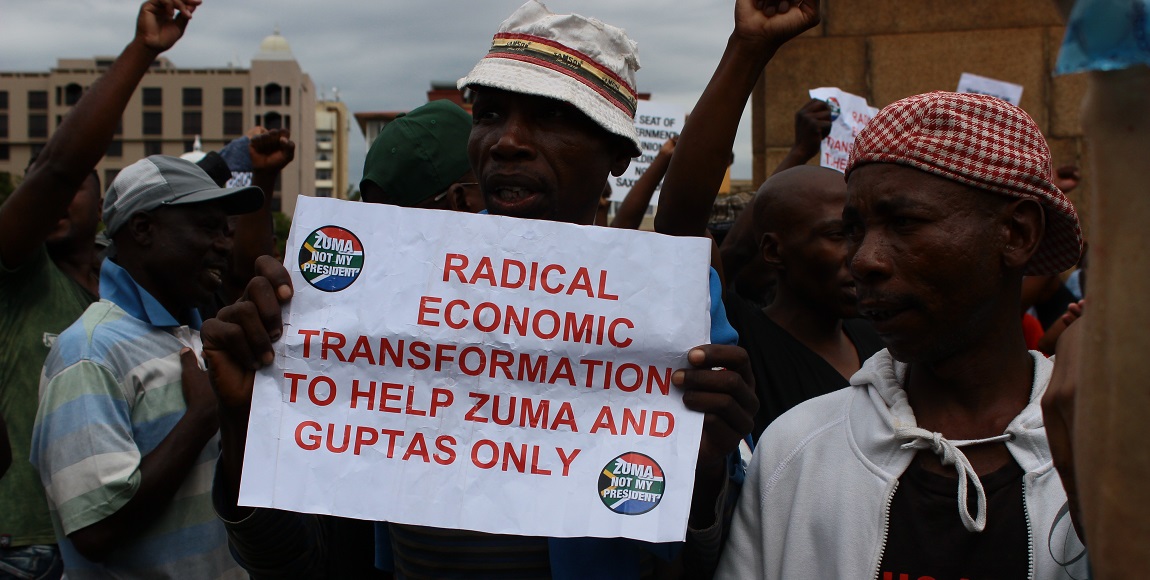There’s a national debate ragin around whether radical economic transformation could be the key to addressing South Africa’s economic inequalities. Nolwandle Zondi spoke to Duma Gqubule, founder of the Centre for Economic Development and Transformation about how the country could achieve genuine economic transformation. Here are three issues he said need to be addressed.
1. Change our macro-economic policies and cut interest rates
Before the 2007 global financial crisis the country experienced a period of strong growth, driven by infrastructure spending by parastatals and government. This created two million jobs, according to Gqubule.
When the crisis reached South Africa in 2009, the Reserve Bank didn’t respond well, he said. “There was an inappropriate response and that is the main reason that we’ve had low growth over the past 10 years.â€
Take China’s response to the financial crisis. “They cut their interest rates and they implemented a $600 billion fiscal stimulus. Most developing countries implemented this strategy and most of them did not have a recession like we did.”
We got it wrong, Gqubule said. Out of the 153 developing countries, he claimed South Africa’s recovery was the worst. “We can’t continue to blame the global economy when everybody recovered from the global financial crisis.â€
Unlike other countries, South Africa raised interest rates instead of cutting them. This is because the Reserve Bank works on an inflation targeting policy. “We target an inflation of 3% to 6%. Every time there is an inflation that’s moved up towards the top range of the target, they have to start increasing interest rates. So basically they should do only one thing and that is to control the inflation rate.â€
Gqubule believes that this is a narrow-minded approach. “Increasing interest rates has a bad impact on the economy, and it results in growth going down and more jobs being lost.â€
He thinks that Treasury should have done what China did but with a R400 billion cash injection.
“What we need to do is stimulate the economy and we have to relax our inflation targeting framework. We can’t have radical transformation as long as we are locked into the straitjacket of the current economic policies that are dictated by the National Treasury and the Central Bank.â€
2. Shift the focus of the economy to industry and manufacturing
“We want to change our economy away from excessive reliance from consumption expenditure [and] financial services, towards productive sectors of the economy,†said Gqubule.
The financialisation of the business sector has grown but there aren’t enough employment opportunities that suit low-skilled workers. “Many of the jobs in manufacturing are appropriate for people who don’t have skills. You’ll find that in financial services, there’s been quite a lot of growth. But the jobs that are created in the financial services are not appropriate for the majority of our unemployed people,†he said.
Gqubule said that there needs to be a focus on creating an inclusive economy. “We can’t create an economy that’s for a labour force that we wish we had. We have to create an economy for the labour force that we currently have.â€
3. Increase black ownership of industries and the economy
Currently all of the major industries in South Africa are dominated by white monopoly capital. “In platinum there’s three companies, in gold there’s three companies, in banking there’s four companies, in agriculture I think there’s a big five. Everywhere there’s a big three, a big four, a big five,†said Gqubule.
The concentration of ownership in the hands of a few big companies worsens inequality, and South Africa is already one of the most consistently unequal countries in the world.
The 2004 Mining Charter was drawn up to increase increase black ownership in the mining sector. The charter specified that companies could only get mining rights if they were 26% black-owned. But, according to Gqubule, it was a sham.
“[It] betrayed from start to finish every single principle of transformation. The benchmark for transformation in the rest of the economy is higher than in the mining sector – it’s almost a ‘get out of jail’ card.â€
The charter also had no targets for communities and workers. “So you have a situation where there is dire poverty in communities next to the mine, and there are shocking conditions of the workers who work underground in the mine.†This is what the Lonmin miners at Marikana were fighting.
“So white monopoly capital, in my view, is a lived experience of any black person who’s trying to enter an industry whether it be retail [or] mining. You find that your opportunities are blocked by the major companies.â€
In terms of real economic transformation, opportunities like these need to be opened up to black people, who bear the brunt of unemployment. Black South Africans made up 39% of the 5.3 million unemployed people in 2015.
Gqubule suggests a “broad free carry“Â model and the nationalisation of mines and banks as a solution.
This model would require 51% of a mining company’s shares to be owned by the government, communities, and employees. A portion of those shares should be free to the community and employees.
“I’ve studied virtually all countries in the world that mine, and almost every one of them have a free carry portion. I’m saying that we should extend the free carry. We should have free shares available to communities and to workers.â€
As long as we are still confined to macro-economic policies that appeal to neoliberal sensibilities, transformation isn’t possible. “The neoliberal framework says that the government really can’t create jobs. We must just suck up to the private companies and create an environment in which they will want to invest in the economy. But that’s not how it works. No, the government has the power. Everywhere where you have growth in a country that has solved the unemployment problem … the government meets the process of creating jobs in the economy.â€









